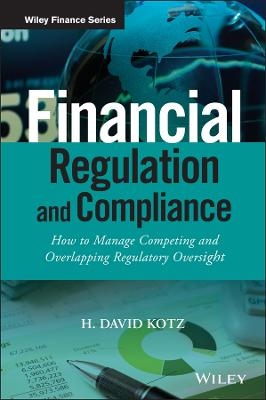
Financial Regulation and Compliance, + Website
John Wiley & Sons Inc (Verlag)
978-1-118-97221-2 (ISBN)
Devise an organized, proactive approach to financial compliance Financial Regulation and Compliance provides detailed, step-by-step guidance for the compliance professional seeking to manage overlapping and new regulatory responsibilities. Written by David Kotz, former Inspector General of the SEC with additional guidance provided by leading experts, this book is a one-stop resource for navigating the numerous regulations that have been enacted in response to the financial crisis. You'll learn how best to defend your organization from SEC, CFTC, FINRA, and NFA Enforcement actions, how to prepare for SEC, FINRA, and NFA regulatory examinations, how to manage the increasing volume of whistleblower complaints, how to efficiently and effectively investigate these complaints, and more. Detailed discussion of the regulatory process explains how aggressive you should be in confronting federal agencies and self-regulatory organizations and describes how commenting on issues that affect your business area can be productive or not. The companion website includes a glossary of terms, regulations and government guidance, relevant case law, research databases, and FAQs about various topics, giving you a complete solution for keeping abreast of evolving compliance issues.
These days, compliance professionals are faced with a myriad of often overlapping regulatory challenges. Increased aggressiveness on the part of regulators has led to increased demand on financial firms, but this book provides clear insight into navigating the changes and building a more robust compliance function.
Strengthen internal compliance and governance programs
Manage whistleblower programs and conduct effective investigations
Understand how to minimize exposure and liability from Enforcement actions
Learn how to prepare for the different types of regulatory examinations
Minimize exposure from FCPA violations
Understand the pros and cons of commenting on regulations
The volume and pace of regulatory change is causing new and diverse pressures on compliance professionals. Navigate the choppy waters successfully with the insider guidance in Financial Regulation and Compliance.
H. DAVID KOTZ serves as a Managing Director at Berkeley Research Group (BRG), an international expert services and consulting firm that offers independent expert testimony, litigation and regulatory support, authoritative studies, strategic advice, and document and data analytics. At BRG, Kotz focuses on internal investigations and consults with and provides expert testimony on the regulation of and securities trading by broker-dealers, investment advisers, hedge funds, insurance companies and banks. He also serves as a compliance monitor for firms that have entered into deferred prosecution agreements and similar arrangements with government agencies. Previously, Kotz served as the Inspector General of the Securities and Exchange Commission (SEC).
Foreword xiii
Preface xvii
Acknowledgments xxiii
About the Author xxv
CHAPTER 1 Jurisdiction of Regulators – Who Regulates Whom and What 1
1.1 Federal Financial Regulatory Structure 2
1.2 The Securities and Exchange Commission (SEC) 3
1.3 The Financial Industry Regulatory Authority (FINRA) 6
1.4 The Commodity Futures Trading Commission (CFTC) 8
1.5 The National Futures Association (NFA) 10
1.6 The Department of Justice (DOJ) 12
1.7 Recent Regulatory Failures to Uncover Fraud 14
1.8 Expert Advice on Overlapping Regulations 19
CHAPTER 2 How to Strengthen Governance and Compliance in Light of New Regulations 23
2.1 Dodd-Frank Act’s Impact on Governance and Compliance 25
2.2 Managing Executive Compensation 29
2.3 Creating Effective Policies and Procedures 30
2.4 Ensuring Accountability within an Organization 32
2.5 Red Flags of an Unethical Culture 33
2.6 Ethical Decision-Making 34
CHAPTER 3 How to Manage Whistleblowers’ Complaints 37
3.1 Oversight and Failures of the SEC’s Whistleblower Program 37
3.2 The Dodd-Frank Act’s Restructuring of the SEC’s Whistleblower Program 41
3.3 Whistleblower Complaints to the SEC since the Restructuring of Its Program 43
3.4 The CFTC’s New Whistleblower Program 45
3.5 Significant U.S. Supreme Court Decision on Whistleblower Complaints 46
3.6 Managing Complaints Brought to Internal Compliance Officials 47
3.7 Putting Appropriate Whistleblower Policies and Procedures in Place 51
3.8 Effect of the SEC and CFTC’s New Whistleblower Programs 52
CHAPTER 4 How to Defend SEC Examinations 55
4.1 SEC Authority to Conduct Examinations 55
4.2 SEC’s Office of Compliance Inspections and Examinations (OCIE) 57
4.3 Types of SEC OCIE Exams 57
4.4 Preparation for the Exams 58
4.5 Process of Examinations 60
4.6 How the SEC Exam Concludes 65
4.7 SEC OCIE Examination Trends 66
4.8 Not Underestimating the SEC Examiners 67
CHAPTER 5 How to Defend FINRA Examinations 69
5.1 FINRA Qualification Standards and Rules and Regulations 70
5.2 FINRA’s Risk-Based Approach 71
5.3 FINRA’s Regulatory and Examination Priorities 71
5.4 Differences between FINRA and SEC Exams 78
5.5 Types of FINRA Exams 79
5.6 Conduct of FINRA Exams 80
5.7 How the FINRA Exam Concludes 83
5.8 Educating the FINRA Examiners 84
CHAPTER 6 How to Defend an NFA Examination 87
6.1 Types of Entities under the Jurisdiction of the NFA 87
6.2 Impact of the Dodd-Frank Act 90
6.3 NFA Examination Process 90
6.4 Preparing for an NFA Exam 92
6.5 Length and Conduct of the NFA Exam 93
6.6 How the NFA Exam Concludes 95
6.7 CFTC Examinations 96
6.8 Focusing on Strict Compliance with the Regulations 97
CHAPTER 7 How to Defend SEC Enforcement Actions 99
7.1 SEC’s Law Enforcement Function 99
7.2 How SEC Enforcement Actions are Triggered 101
7.3 Commencement of an SEC Enforcement Action 102
7.4 Converting the Inquiry to a Formal Investigation 103
7.5 Discovery Conducted by the SEC 104
7.6 The SEC Enforcement’s “Wells” Process 105
7.7 Use of Experts in SEC Enforcement Proceedings 108
7.8 Settlement Discussions 109
7.9 Trends in SEC Enforcement 110
7.10 Minimizing Exposure in an SEC Enforcement Case 114
CHAPTER 8 How to Defend FINRA Enforcement Actions 115
8.1 FINRA Disciplinary Actions 116
8.2 FINRA Enforcement Process 123
8.3 FINRA’s Formal Proceeding 125
8.4 Challenges of FINRA Enforcement Process 125
8.5 Conduct of the FINRA Hearing 126
8.6 Settlement Possibilities 128
8.7 Disciplinary Sanctions Available to FINRA 128
8.8 Right to Appeal Decision of Hearing Panel 129
8.9 Recent Trends in FINRA Enforcement 129
8.10 Mounting an Aggressive Defense 130
CHAPTER 9 How to Defend CFTC Enforcement Actions 131
9.1 Increased Aggressiveness on the Part of CFTC Enforcement 131
9.2 Types of Enforcement Actions Brought by the CFTC 133
9.3 Triggers for CFTC Enforcement Actions 137
9.4 CFTC Enforcement Process 137
9.5 Differences between CFTC and SEC Enforcement Proceedings 138
9.6 The CFTC “Wells” Process 139
9.7 CFTC Enforcement’s Use of Experts 140
9.8 Settlement Discussions 141
9.9 CFTC Enforcement’s Use of Administrative Proceedings 142
9.10 Trends in CFTC Enforcement 142
9.11 Flawed Assumptions about CFTC Enforcement Process 143
9.12 Strategies for CFTC Enforcement Cases 144
CHAPTER 10 How to Defend NFA Enforcement Actions 147
10.1 NFA Disciplinary Actions 147
10.2 How Complaints are Triggered 148
10.3 Investigative Process 149
10.4 Settlement 150
10.5 The Hearing Panel and Hearing Committee 151
10.6 Conduct of the Hearing 152
10.7 Written Decision after the Hearing 153
10.8 Appeal of an Adverse Decision 153
10.9 The MRA Procedure 154
10.10 Types of Penalties Assessed by the NFA 155
10.11 Number and Types of Disciplinary Actions 156
10.12 Trends in NFA Enforcement 159
10.13 Preparing a Defense 159
CHAPTER 11 How to Participate in the Regulatory Comment Process 161
11.1 Dodd-Frank Rulemaking 161
11.2 SEC Rulemaking Process 162
11.3 Candidates for Comments 163
11.4 Role of Trade Association in Comment Process 163
11.5 Content of the Comment Letter 165
11.6 Approaches to an Effective Comment Letter 168
11.7 Significance of the Economic Impact of Proposed Regulations 168
11.8 Requesting Meetings with Agency Officials 170
11.9 Submitting Comments after the Deadline 171
11.10 Learning about Rulemakings 171
11.11 Assistance from Outside Counsel 172
CHAPTER 12 How to Defend FCPA Claims 173
12.1 FCPA Provisions 173
12.2 FCPA Enforcement Authority 174
12.3 Violations of the FCPA 175
12.4 Penalties for Violating the FCPA 176
12.5 FCPA Exemptions 176
12.6 DOJ/SEC Guidance 177
12.7 The U.K. Bribery Act 179
12.8 Devising Effective Compliance Programs 180
12.9 Training on Compliance Standards 181
12.10 Achieving a Culture of Compliance 181
12.11 Risk-based Due Diligence and Monitoring 182
12.12 Conducting FCPA Compliance Assessments 183
12.13 Importance of Risk Assessment 184
12.14 Management of Third Parties 185
12.15 Conducting Due Diligence on Acquisition Targets 187
12.16 The Triggers for an FCPA Enforcement Action 188
12.17 Self-disclosing Violations 189
12.18 Reducing Exposure 190
CHAPTER 13 How to Conduct Internal Investigations 191
13.1 Limiting Exposure through Effective Internal Investigations 191
13.2 Lessons Learned from High-Profile Investigations 192
13.3 Commencing the Internal Investigation 193
13.4 Retaining an Outside Investigator 194
13.5 Initial Steps of Investigation Process 195
13.6 Methods of Obtaining Information 195
13.7 Collecting Documents 196
13.8 Strategies for Conducting Interviews 197
13.9 Briefing Management during an Investigation 200
13.10 Drafting the Investigative Report 201
13.11 Incorporating Recommendations for Improvement 201
13.12 Protecting Files Associated with Internal Investigation 202
13.13 Retaining the Investigative Report 204
CHAPTER 14 Conclusion 205
14.1 Overlapping Jurisdictions after the Dodd-Frank Act 206
14.2 Regulatory Failures Post-Financial Crisis 209
14.3 Improving of Coordination between Regulatory Agencies 210
14.4 Understanding the Regulatory Climate 212
About the Website 215
Index 217
| Reihe/Serie | Wiley Finance Series |
|---|---|
| Verlagsort | New York |
| Sprache | englisch |
| Maße | 158 x 231 mm |
| Gewicht | 431 g |
| Themenwelt | Recht / Steuern ► EU / Internationales Recht |
| Recht / Steuern ► Wirtschaftsrecht ► Bank- und Kapitalmarktrecht | |
| Wirtschaft ► Betriebswirtschaft / Management ► Finanzierung | |
| ISBN-10 | 1-118-97221-X / 111897221X |
| ISBN-13 | 978-1-118-97221-2 / 9781118972212 |
| Zustand | Neuware |
| Haben Sie eine Frage zum Produkt? |
aus dem Bereich


